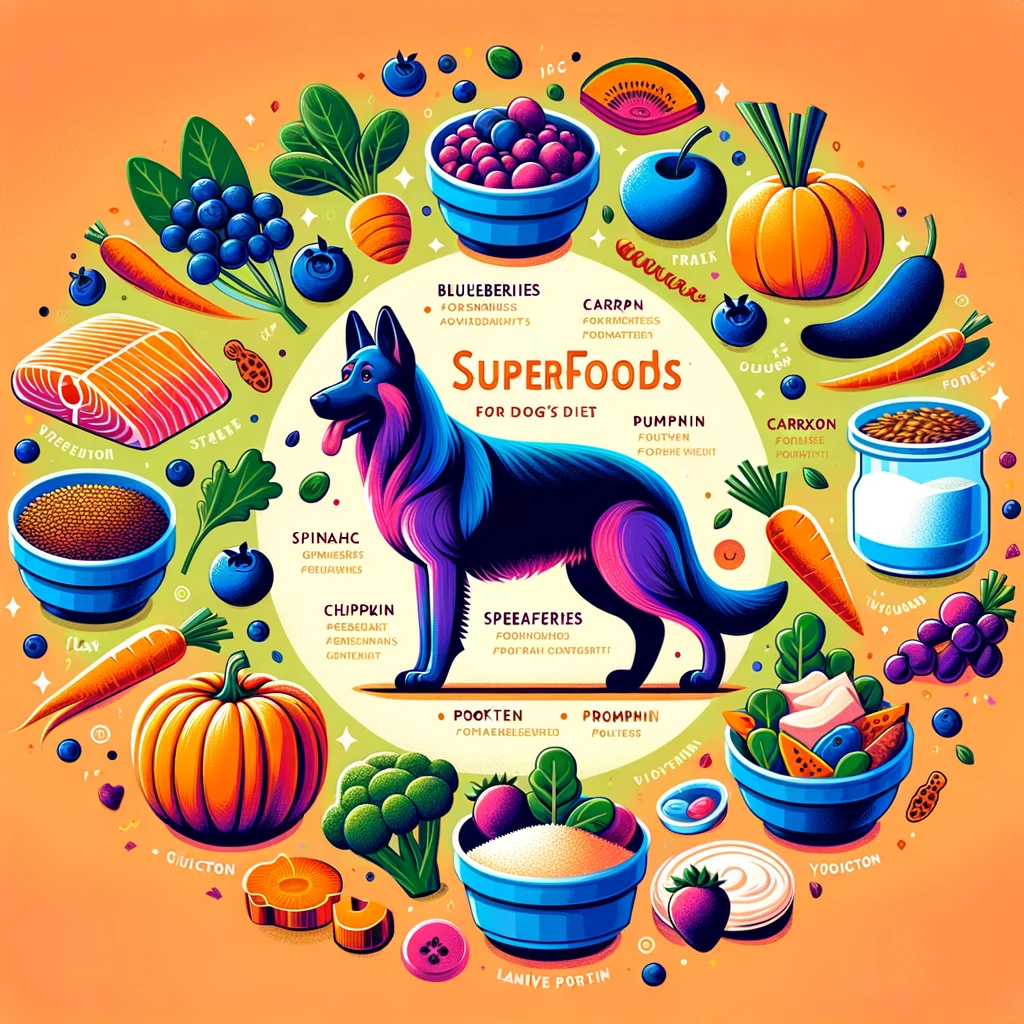10 Superfoods to Include in Your German Shepherd’s Diet

Superfoods are key to enhancing your German Shepherd‘s health and energy, bringing various benefits. They include probiotics and prebiotics to aid digestion; chia seeds and flaxseed, full of omega-3s and antioxidants, for a shiny coat; Kelp supports thyroid health; berries fight inflammation; sweet potatoes boost energy; kale aids in detox and heart health; mushrooms enhance immunity; and hemp seed oil improves skin health and reduces inflammation.
These superfoods provide many vital nutrients, improving your German Shepherd’s health and keeping their coat shiny and digestion smooth.
1. Probiotics and Prebiotics
Keeping your German Shepherd’s digestive system healthy is vital, and that’s where probiotics and prebiotics come in. Probiotics are good bacteria that help with digesting food and absorb nutrients. They keep the gut’s bacteria balance in check, affecting your dog’s health and immune system. Prebiotics feed these good bacteria, helping them grow and keep your dog’s digestion running.
Adding foods high in probiotics and prebiotics to your dog’s diet can help prevent stomach problems like diarrhea or constipation and boost their immune system, making them stronger against infections and sickness. Foods such as fermented vegetables and certain dog-safe supplements are great sources of probiotics. Foods high in prebiotics include inulin, which you can find in bananas and asparagus. It’s a good idea to talk with a vet to find the best and right amounts of these foods to support your dog’s health.
2. Chia Seeds
Chia seeds are a superfood treasure for German Shepherds, packed with omega-3 fatty acids that make their coat shiny and healthy while caring for their skin. These tiny seeds contain antioxidants that help fight inflammation and protect against health problems by tackling oxidative stress. They’re also high in fiber for better digestion, calcium for strong bones, and protein to help keep muscles in good shape.
Adding chia seeds to your dog’s meals is simple. Soak them first to make them safer and prevent any choking. But chia seeds do more than support physical health; they also boost your dog’s energy and happiness.
3. Kelp
Packed with nutrients, Kelp provides many vitamins and minerals, such as iodine, keeping your dog’s thyroid and metabolism working. It’s also full of antioxidants that help fight off harmful particles in the body, lowering the chance of long-term health issues and keeping your dog lively.
When you add Kelp to your German Shepherd’s meals, it’s important to be careful because of its high iodine levels, which can be too much if given in large quantities. Make sure to use Kelp that’s safe for dogs, so your furry friend can enjoy its health benefits without any risks.
4. Berries
Berries like blueberries and strawberries are not treats that dogs find delicious; they are also full of antioxidants, vitamins, and fiber, making them an excellent choice for reducing inflammation and supporting cardiovascular health. The antioxidants help neutralize free radicals, which can lead to chronic diseases and aging.
In moderation, berries can be a healthy snack for your German Shepherd, offering a sweet yet nutritious boost to their diet. Always introduce new foods in small quantities to avoid digestive upset.
5. Sweet Potato
Sweet potatoes are an excellent choice for your dog’s diet, packed with dietary fiber to help digestion. They’re loaded with vitamins A, C, and B6, which are great for your dog’s eyesight, immune system, and brain health. Also, sweet potatoes’ minerals like potassium and manganese support your dog’s metabolism and bone strength, making them a well-rounded food choice.
Sweet potatoes can be a great energy source and important nutrients for active dogs like German Shepherds. Remember to cook them without any added spices or ingredients to ensure they’re good for your dog.
6. Kale
Kale is packed with essential nutrients, including vitamins A, K, and C, which support vision, blood clotting, and the immune system. The antioxidants and calcium content further contribute to heart health and bone strength. Thanks to its fiber and sulfur content, introducing kale into your German Shepherd’s diet can aid detoxification.
When feeding your dog kale, it’s crucial to do so in moderation, as large amounts can cause gastrointestinal upset. Start with small, well-cooked portions to ensure it’s digestible.
7. Mushrooms
Certain mushroom varieties can benefit dogs, offering vitamins, minerals, and antioxidants that support the immune system and health. Sticking to dog-safe mushrooms is vital, as many wild mushrooms are toxic to dogs.
Consultation with a veterinarian is advisable when adding mushrooms to your German Shepherd’s diet, ensuring you choose safe varieties and appropriate quantities to avoid potential health risks.
8. Hemp Seed Oil
Hemp seed oil is packed with important fatty acids, omega-3 and omega-6, which are key for keeping your German Shepherd’s skin healthy and their coat glossy. Its anti-inflammatory qualities can also help with joint health, easing pain from arthritis.
When adding hemp seed oil to your German Shepherd’s meals, begin with tiny amounts. This way, you can see how your dog responds, ensuring it benefits their health without causing any problems.
9. Flaxseed
Flaxseed is another excellent source of omega-3 fatty acids, fiber, and lignans, which provide health benefits ranging from improved skin condition to digestive health and anti-inflammatory effects. These nutrients make flaxseed a valuable supplement for promoting health and well-being in German Shepherds.
Ground flaxseed is the best form to ensure your dog can digest it and absorb its nutrients. It can be mixed into your dog’s regular food, offering a simple way to boost their intake of essential nutrients.
10. Additional Vegetables and Protein Sources
Adding vegetables like pumpkin, carrots, cooked potatoes, peas, corn, cauliflower, spinach, cabbage, broccoli, radicchio, green beans, and red bell peppers to your German Shepherd’s diet brings essential vitamins and minerals. These veggies help with better digestion and boost the immune system.
For proteins, German Shepherds eat chicken, beef, turkey, lamb, salmon, and rabbit well. These meats are important for building muscles and keeping energy high. Eggs are also great for dogs, full of amino acids, vitamins, and minerals.
Incorporating These Foods into Your GSD’s Diet
Avoiding digestive upset is essential when incorporating these superfoods into your German Shepherd’s diet. Start with small amounts and observe how your dog reacts before making it a regular diet. Also, remember that while these superfoods are beneficial, they should complement a well-balanced diet tailored to your dog’s specific needs.
Conclusion
Adding ten superfoods to your German Shepherd’s meals, plus various veggies and good proteins, ensures your pet gets all the vital nutrients they need for their health. This nutrient-rich diet helps with everything from keeping their digestion smooth to making their fur glossy, and it plays a big part in giving your dog a long, healthy life. Talking to a vet before changing your dog’s diet is important, especially if they have special health issues or needs.

I’m Martin, and I grew up in the super cool city of Seattle. You know, the place with all the incredible mountains and forests? Yeah, that’s my playground!
Ever since I was little, I’ve been all about nature. I used to wander around the woods with a notebook, doodling all the cool plants and animals I’d find.
